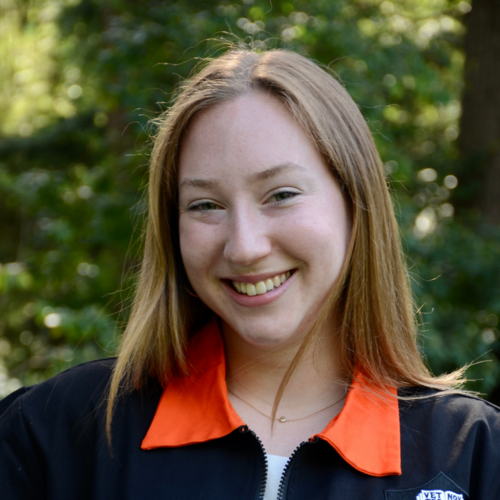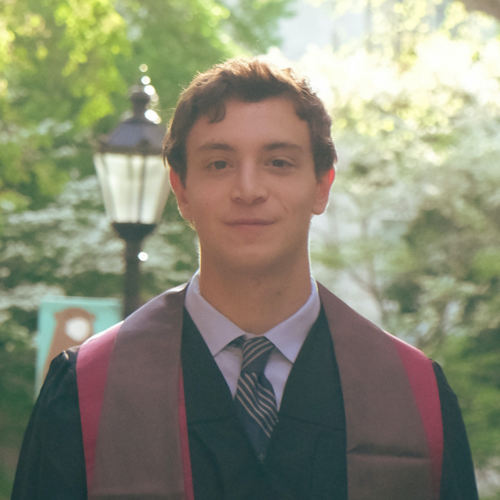Every year, the Fulbright commission in Belgium organizes the EU-NATO Seminar and invites US Fulbrighters from all across Europe. Normally, participants attend in person. However, due to the pandemic, this year's seminar was conducted entirely online. Despite the online format, the seminar was extremely beneficial, according to the two participants that Fulbright Austria nominated to attend. Below, 2021–22 US Fulbright students Sophia Winograd and Ethan Franzblau share their insights into the seminar.
EU-NATO Seminar
12 April 2022Two Fulbright Austria program participants attended the annual EU-NATO Seminar, which was held virtually this year. Read about their experiences in this article.
Sophia Winograd
The seminar began, as we all have grown quite accustomed to, by clicking a Zoom link. Suddenly we were in a virtual room of 44 Fulbrighters throughout Europe, as well as the heads of the Fulbright Commission for Educational Exchange between the United States, Belgium and Luxembourg. This was the first time the Fulbright EU-NATO Seminar took place virtually, and while I’m sure all of us would’ve rather been in Brussels, we all still benefited from the opportunity to virtually experience the European Parliament, the European Commission, and NATO.

We were welcomed by Dr. Jerome Sheridan, chairman of the Fulbright commission in Belgium, and were given a brief introduction to the EU and its major institutions. Throughout our visits, we grappled with the threat of Russia and the current issue in Ukraine, the COVID-19 pandemic and returning to “normalcy”, the democratic backsliding of Poland and Hungary, the digital transition, and the European Green Deal – hearing from representatives from the European Parliament, European Commission and NATO. On our last day, we had the chance to literally “virtually tour” NATO headquarters through a thirty-minute narrated video that allowed us to see both the exterior and interior of the old and new NATO buildings and offices as well as short clips of significant political moments that had occurred there. After our virtual visit, the seminar concluded with the US Mission to NATO, and we had the opportunity to discuss careers in the United States Foreign Service and how we, as Fulbrighters, might be able to get involved in that world. As I contemplate a future career in policy, I found this discussion as well as the ensuing conversations with other Fulbrighters about possibilities after Fulbright to be the perfect conclusion to the experience. After having delved into all of these various political institutions and having learned so much from all of the speakers, to be able to digest the seminar in its entirety and reflect on how we all envision our potential careers progressing was invaluable.
While we each heard snippets of other Fulbrighters’ research, the virtual aspect did pose a bit of an obstacle with connecting with each other to discuss our projects and getting to know each other. However, hearing the probing questions my peers posed and the interesting discussions that ensued still left me with a renewed excitement for my own research in Vienna, where I’m trying to disentangle the way the Austrian far-right has instrumentalized the issue of the pandemic and how the Austrian case compares to the rest of Europe. And while I feel inspired by my fellow Fulbrighters in Vienna, it was eye-opening to see so many other young researchers and teaching assistants residing all across Europe, pursuing such a wide range of fascinating projects. The Fulbright EU-NATO Seminar definitely left me with a greater understanding of how these significant political institutions actually operate in our present world and helped to reaffirm my career interest in the sphere of global policy.
Ethan Franzblau
Particularly at this point in history, as a Fulbright grantee in Europe, I find myself wondering what today’s geopolitics mean for the future of the European Union and NATO. In February, I gathered (virtually) with fellow Fulbrighters living across Europe to share experiences and hear from thinkers from within these institutions on the most pressing questions facing Europe and transatlantic alliances today.

The seminar opened with welcoming remarks followed by an introduction to the EU and the European Parliament. We learned a great deal about how the EU came to exist, how it functions, and how its history and structure interacts with contemporary issues. On the second day, we visited the European Commission virtually and heard about the EU’s role in combatting climate issues as well as the future of the digital economy in Europe. On our final day of programming, we were treated to a virtual visit to NATO headquarters, during which we received a briefing on NATO’s current agenda, toured the headquarters itself, and learned more about the dynamics of the relationship between the United States and NATO.
My research project, which focuses on the specific Austrian context of citizenship as a reparation for genocide, is deeply connected to the larger topic of citizenship in modern Europe and how historical ideas of citizenship interact with our modern politics. It was fascinating for me to consider how the question of citizenship in the Austrian context that I am exploring is related to the evolving nature of citizenship across Europe, influenced by forces from increased migration from conflict areas to reparation efforts for persecuted groups. In a time of increasing mobility and armed conflict, questions of national belonging—both formal and informal—are front of mind. It was both personally edifying and humbling to consider these questions in light of the insight of experts from within the EU and NATO.
A highlight of the experience was at the end of each day, when the seminar participants gathered virtually to digest what we had heard and chat about our time in our host countries thus far. The seminar was an incredible opportunity to connect with fellow Fulbrighters and hear about a wide range of research interests and experiences of intercultural exchange across the continent. We shared stories ranging from culture clashes and language barriers to reflections on how our project work and everyday lives had immeasurably expanded our understanding of our host countries and their diverse cultures. I feel incredibly lucky to have had the opportunity to attend this seminar and to hear from both seasoned diplomats and fellow Fulbrighters about the challenges and opportunities the European and transatlantic projects are faced with today.